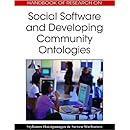Activity description:
We have in theory camp the need to combine some theoretical aspects for developing a theory framework for social semantic server, action design approach.
We can use wordpress with KB widget for discovering collectively created resources.
Every participant uses in the first stage KB to search and tag suitable resources. Each resource gets the assignment tag (e.g. social semantic server task has tag social semantic server, or action research has task action research) and as many additional tags as one would need to describe the meaning dimensions of added resources. Each resource added to KB is also shared with others.
In Social semantic server we may have to types of knowledge resources emerging:
– personal resources (personal cognitive niches) around the assignment tag (for example person A has collected resources, which have additional tags systemic cognition, knowledge maturing; whereas person B has tagged resources additionally with communities of practice, scaffolding, adaptive learning etc.).
– shared resources around the assignment tag ( this compiles all resources that have tag social semantic server, as well as the associated tags and presents this tag-set to each user) (collective niche).
In the second phase of the activity, wordpress is used as the meaning-making tool. Each participant has in wordpress the widget with the KB tags. This widget enables to see personal tag-cloud with a certain assignment tag, and shared tag-cloud with the certain assignment tag. Each person uses shared tags to search from resources and uses liked tags and resources for elaborating the question, how social semantic server activities can be explained with different theoretical perspectives.
The meaning-making activity ends with tagging the reflections with the assignment tag and other additionally selected tags. Basically, these matured resources become part of the shared pool of knowledge and may be used in the next iterations of the same activity.
Research questions about systemic cognition: How is the shared knowledge explored and made use of by individuals at meaning-making?
Does personal knowledge (personal cognitive space) determine, which tags are perceived as relevant in the shared tagcloud? We can compare personal tags that are related with assignment tag with the activated tags in the shared tag-cloud around the assignment tag to discover if there is dependency.
Do the most frequently utilized tags in the shared tagcloud (accumulated patterns in the collective niche) get more attention for selecting resources? We can compare most frequent tags with the activated tags in the shared tag-cloud around the assignment tag to discover if there is dependency.
How does the personal cognitive space mature as a result of using collective cognitive space? We can compare initial (phase1) and final (phase 2) tagsets of elaborated resource tags of individuals – is there convergence happening between individuals due to pattern-usage? Can the convergence happen after some cycles of the activity?
Explanation: systemic cognition is the distributed cognition in which personal cognitive space is embedded to the collective cognitive space. However we do not know how collective knowledge space becomes activated due to personal cognitive spaces (basically how culture influences what we decide).
Additionally, in KB some resources can be rated by giving stars. How would such rating increase the visibility and usage of certain tags (basically can the collectively validated resources be chosen more frequently) – basically can we enhance pattern-visibility in the culture, and whether such patterns be
preferred?
We may try to play such an activity among ourselves in HTK, or among the colleagues in Layers.
The same idea in variations in topics may be done with application partners. For example we can choose a problem-related tag as the central assignment tag. We may also try to play the same activity with students in association with some idea, central concept, but this is better doable in autumn term as part of some master or doctoral course.










